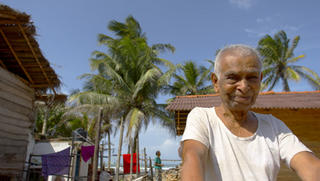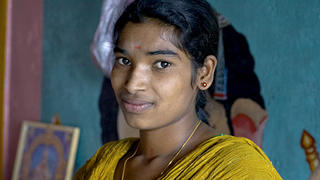
The message was repeated over and over - "The government no help". I am walking along the foreshore of Dewatta, a fishing community on the western outskirts of Galle. There are fishing boats and outriggers along the beach and powerful waves crash into the shore and nearby breakwaters. Even without the tsunami the force of the ocean is impressive, but across the road the tent communities are by far the more compelling sight. Hundreds of people occupy the land on either side of the railway tracks, living in camping tents donated by foreign aid agencies during the tsunami emergency response.
There is no shortage of young men who want to show me their homes. Firdous is the most persistent talker although his English lacks the employ of tense and definite articles, "Very problem. Tsunami coming. You see my house you come now." I follow him through the village. Sewerage pools up near the tracks. Access to town water is provided by a single faucet, but it too is surrounded by the contaminated sludge. Between the tracks and the road there are very few standing structures other than tents, but across the railway line a few temporary timber homes are evident and some concrete houses that withstood the disaster.
As we walk along the tracks towards Firdous’ home the children gather around and there’s an air of excitement. They are laughing and full of fun, jumping around and playing. Some practice their English and ask questions. A chance to have their photo taken starts them up again and they go a little crazy to grab attention – even the older ones. The mothers are smiling and laughing too.
Firdous points to each of the families who have gathered around and explains who has lost a mother, father, sister, brother, son or daughter. They in turn respond to acknowledge this momentarily, matter of fact, and then continue laughing and playing with the children. For me the experience is quite surreal that the depth of their personal tragedy is absent from the conversation. They speak very little about what has happened, instead focusing on what their current needs are. There is a shortage of work that compounds the problem and, for men like Firdous, the sea is no longer a provider of income, "No good life. I am fisherman. No job. No good life tsunami coming".
Several families show me their tents. They are large camping tents that would look right at home in a caravan park. Most are double lined with very strong plastic. They are effective in keeping out the rain but have poor ventilation and get very hot even on a cloudy day. What strikes me most is the bareness inside the tent. There is literally nothing to see. One half may contain a single bed, but mostly the families sleep on the floor. There are no chairs, cupboards, wardrobes or possessions. Nothing.
We take some more photos and talk a little about the lack of aid. Everyone I have met today says the same phrase, over and over, "Government no help". There is no evidence that anyone has a plan for people like Firdous and his relatives. Home building projects run by international aid agencies require land ownership - tent people like Firdous are in a precarious position as the government has mandated changes to title deeds for land within 100 metres of the shoreline. There is very little political will to compensate tsunami victims and if the issue hasn’t been addressed 9 months after the disaster then it probably never will be. In the absence of insurance, title deeds and work the temporary scenario is looking ever more permanent.
As I leave I wave goodbye to the children. They are full of smiles now, but what will become of them when the laughter stops?

